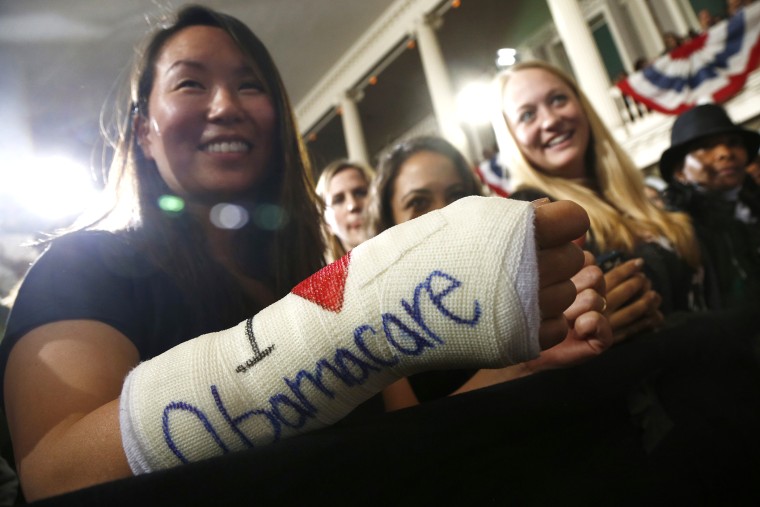The Affordable Care Act's critics, at least on the right, have seen the law's recent successes, but they're not yet convinced of its progress. Byron York, responding to a recent
MaddowBlog post,
wrote the other day:
To hear administration officials and their supporters in the press tell it, this is a great time for Obamacare. People who signed up for coverage are actually paying for it; more insurance companies are joining exchanges; some consumers have more choices than originally envisioned. "The news surrounding the Affordable Care Act has been so good this week, it's almost hard to know where to start," wrote MSNBC's Steve Benen in a recent post headlined "Everything's Coming Up Aces for the ACA." Not so fast.
York's complaint is that there may be "good news" associated with the health care law, but it applies to only part of the population. The recent progress, the headline to his piece argued, "applies only to the poor."
He didn't raise any factual concerns about my report -- the evidence I cited is legitimate and accurate -- but rather, York believes the benefits are not being felt broadly enough.
There are a couple of important problems with this line of analysis. The first should be fairly obvious: millions of Americans who aren't poor are benefiting from ACA benefits. This includes consumers of every income level who are no longer running into lifetime or annual caps, young adults of every income level who are able to stay on their family plans until they're 26, middle-class seniors who are better able to afford prescription medication, consumers of every income level who've received refund checks due to the medical-loss ratio, etc.
Sure, families struggling most tend to benefit the most -- they'll get access to medical care at an affordable price, which is what they lacked before -- but they're hardly the "only" beneficiaries.
The second is the larger context: the law's conservative detractors have apparently been reduced to this line of criticism after the other lines fell apart.
As
Jon Chait noted, it wasn't too long ago that the right argued that the ACA may be signing up consumers, but only folks who already had insurance. That talking point turned out to be wrong. So conservatives began arguing that "Obamacare" hadn't done enough to cut the uninsured rate. That talking point turned out to be wrong, too.
Opponents of the law on the right argued that consumers wouldn't want to, or be able to, buy coverage through exchanges. They also said premiums would spike. All of this turned out to be about as accurate as the rhetoric about "death panels" and "death spirals."
And as Chait
added, what we're left with is, in effect, a complaint about the redistribution of wealth.
It is true that Obamacare is far more helpful to people lower down the income scale. The poorest people get Medicaid, which is free. Those higher up the income ladder get tax credits, which phase out at $45,000 a year for an individual, and $94,000 a year for a family of four. (I wouldn't call people earning under those levels "poor.") Of course, people who get employer-sponsored insurance also get their coverage paid for with "other peoples' money." The difference is that employer-sponsored insurance uses a tax deduction, which gives the largest benefits to those who earn the most money, as opposed to Obamacare's sliding scale tax credit, which gives the most to those who earn the least. But at least conservatives are now representing their true bedrock position on Obamacare. It is largely a transfer program benefitting people who either don't have enough money, or pose too high a health risk, to bear the cost of their own medical care. Conservatives don't like transfer programs because they require helping the less fortunate with other peoples' money.
Charles Gaba
has more along these lines.
